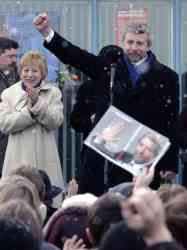Mark Brzezinski On Making Russia A Better Neighbor
... "Ukraine and Belarus are themselves contrasts between striving for independence and extreme dependency. Ukrainian President Viktor Yuschenko has been clear about the goal of Ukraine's membership in the European Union. But he realizes the vital importance of not estranging Russia and has taken steps to develop dialogue with the Kremlin, even after Russia shut off gas supplies on Jan. 1. By contrast, Belarus remains a dependency where democracy demonstrations in the lead-up to the March 19 presidential election have been brutally crushed.
In the Caucasus and Moldova, Russia has tried to readjust the orientation of her neighbors, with little success. In 2002, Russia told Georgia to end its political and security relationship with NATO, and urged Georgia to accept Russian bases for the long-term. In Central Asia, dictators who previously resisted closer cooperation with Moscow have been encouraged by the Kremlin's urging to be heavy-handed with any signs of religious revival. Only Russia and China endorsed the Uzbekistan government's killing of hundreds of demonstrators in Andijon last summer.
There are signs that Russia is adjusting to new realities. In Georgia, Russia accommodated itself to Georgian central control over Ajaria and helped with the removal from Georgia of separatist leader Aslan Abashidze. In 2005, Russian and Georgian authorities agreed to troop withdrawal with a timetable and benchmarks, and ended their demand for financial compensation. But there are potential loopholes through follow-on pacts, and Russian troops and arsenals in Georgia may be redeployed to Armenia -- alarming Azerbaijan.
It's in Russia's interest, and in America's, for there to be greater trust and cooperation between Russia and her neighbors. The United States should strive to get Russia to understand that it is not pursuing a policy to transform the region into a zone of American control through "color revolutions." Instead, what's been happening there is part of a process of what's been happening in Europe for more than 50 years....
In the long term, the West might consider a more dynamic vision of its relationship with a democratic Russia. As the Russia task force of the Council on Foreign Relations [recommended in a Report released on Monday]: "Western leaders should also diversify their political contacts within Russia. It's not enough to meet with representatives of 'civil society.' Open and routine contact with opposition political figures and organizations carry a more potent message."" ...
Mark Brzezinski "Making Russia a better neighbor" The Boston Globe March 8, 2006 via Boston.com

Flanked by his wife, opposition leader Alexander Milinkevich, the main challenger to Belarus' President Alexander Lukashenko in the March 19 presidential election, addresses his supporters in Minsk, on Wednesday, March 8, 2006. He is the candidate of the Opposition United Front. He speaks Belarusian, Russian, Polish, English, and French.
EuroNews Interview with Alexander Milinkevich March 8, 2006:
http://www.euronews.net/create_html.php?page=detail_interview&article=330435&lng=1
Alexander Milinkevich Web-site. http://en.milinkevich.org/
Photo credit: Sergei Grits and the Associated Press via ROMPRES. With thanks.
http://foto.rompres.ro/index.php?i=608066 [Thumbnail used.]
In the Caucasus and Moldova, Russia has tried to readjust the orientation of her neighbors, with little success. In 2002, Russia told Georgia to end its political and security relationship with NATO, and urged Georgia to accept Russian bases for the long-term. In Central Asia, dictators who previously resisted closer cooperation with Moscow have been encouraged by the Kremlin's urging to be heavy-handed with any signs of religious revival. Only Russia and China endorsed the Uzbekistan government's killing of hundreds of demonstrators in Andijon last summer.
There are signs that Russia is adjusting to new realities. In Georgia, Russia accommodated itself to Georgian central control over Ajaria and helped with the removal from Georgia of separatist leader Aslan Abashidze. In 2005, Russian and Georgian authorities agreed to troop withdrawal with a timetable and benchmarks, and ended their demand for financial compensation. But there are potential loopholes through follow-on pacts, and Russian troops and arsenals in Georgia may be redeployed to Armenia -- alarming Azerbaijan.
It's in Russia's interest, and in America's, for there to be greater trust and cooperation between Russia and her neighbors. The United States should strive to get Russia to understand that it is not pursuing a policy to transform the region into a zone of American control through "color revolutions." Instead, what's been happening there is part of a process of what's been happening in Europe for more than 50 years....
In the long term, the West might consider a more dynamic vision of its relationship with a democratic Russia. As the Russia task force of the Council on Foreign Relations [recommended in a Report released on Monday]: "Western leaders should also diversify their political contacts within Russia. It's not enough to meet with representatives of 'civil society.' Open and routine contact with opposition political figures and organizations carry a more potent message."" ...
Mark Brzezinski "Making Russia a better neighbor" The Boston Globe March 8, 2006 via Boston.com

Flanked by his wife, opposition leader Alexander Milinkevich, the main challenger to Belarus' President Alexander Lukashenko in the March 19 presidential election, addresses his supporters in Minsk, on Wednesday, March 8, 2006. He is the candidate of the Opposition United Front. He speaks Belarusian, Russian, Polish, English, and French.
EuroNews Interview with Alexander Milinkevich March 8, 2006:
http://www.euronews.net/create_html.php?page=detail_interview&article=330435&lng=1
Alexander Milinkevich Web-site. http://en.milinkevich.org/
Photo credit: Sergei Grits and the Associated Press via ROMPRES. With thanks.
http://foto.rompres.ro/index.php?i=608066 [Thumbnail used.]


0 Comments:
Post a Comment
<< Home